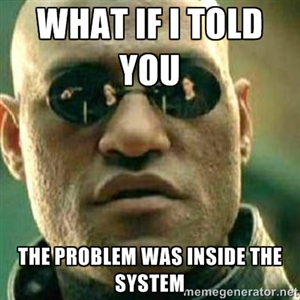It’s been said that I resemble a younger version of a certain Slovenian philosopher by the name of Slavoj Zizek.
And it’s not just appearance, its even the mannerisms; the hand gestures, the nervous habits. (Seriously, all I’m missing is the accent. It’s weird.) So, maybe it’s this similarity that makes me partial to him. Regardless, he does raise an interesting question about a very popular author, Dan Brown.
Now, the infamous “Da Vinci Code” is far from new, and criticism of it is dated as well. However, one thing has gone relatively unnoticed, except by Zizek.
Zizek points this out in In Defense of Lost Causes saying,
“In The Da Vinci Code, the sexual life of Christ and Mary Magdalene is the excess which inverts (covers up) the fact that the sexual life of Sophie, the heroine, Christ’s last descendant, is non existent […]”
So, why is it exactly that Dan Brown, and others who are so devoted (not that Dan Brown was really devoted… he just wanted to write a novel and make money) to the idea that Christ was married, for Jesus Christ, the man from Nazareth, the Son of God, to have sex?
There are many theories, most involving an attempt to feminize, sexualize, or otherwise change the shape of Christianity. However these are easily visible at the surface, and I honestly wouldn’t have needed Zizek’s comment. What I think is more interesting, is not the fact that Brown depicts a Jesus who has sex, but that he depicts a Jesus who has sex while the two hetero-sexual protagonists of the opposite sex have no relations at all. This doesn’t make any sense at all, if you’re going to bombard an audience with sexual symbolism, even going as far as to make the whole damn plot revolve around the sex life of GOD HIMSELF, why would you leave the “Adam and Eve” of this hero’s tale celibate (and not even in the holy, priestly sense… just the girl awkwardly walking to her car by herself after an uncomfortably silent date sense.) My confusion is only increased again by the fact that Sophie, the female protagonist, is French, since French women are perhaps one of the most basic and cliched sex symbols in American culture. And to make things more ridiculous, there’s not even any real reason that’s ever given as to why they feel no need to be together after all the horrible things they’ve dealt with so well together. (It makes me wonder if they called each other after all of that. How would that conversation even go?… “So… uhhh… Have any crazed monks or old English men try to kill you lately?… No?… Well, I guess that was just a one time thing, huh?…” )
What then, is going on here?! Why does Jesus get to have sex, and all the protagonist gets is an awkward silence as it slowly becomes apparent to him that the author is not going to match him up with the lovely French woman he’s been traveling with all this time? (The author can truly be the cruelest of gods.)
The answer may be painfully simple. Justification.
Christ, even in our post-Christian world of positive science, space travel, and the internet, is a symbol inextricably linked to divinity. And if Christ is symbolizing God, in Brown’s work, then his sex life is of the utmost importance. If God were involved in a steamy, animal, love affair, then all of creation would by extension be an orgiastic frenzy of *pardon my usage* Biblical proportions. Therefore, the whole of the universe is one big cosmic act of intimacy. This on its own still does not, however, explain why Langdon and Sophie remain outside of this intimacy, which is according to the theory of reality proposed by the novel is the formal basis of all of existence, as completely asexual characters.
This is where the justification comes in. Sophie and Langdon, in this awkward absence of relation, represent our culture. The cry is heard, “But how can that be? Our society is so decadent and lustful!” While I’d be willing to agree with this, it doesn’t mean that our society is particularly sexy. The loving and perfect union, in the novel, between Christ and Mary Magdalene is a far cry from the pitiful, even if plentiful, sex lives of most of those who dwell in our age. We are a society who has so utterly saturated itself with contraception and pornography that we have raised a generation of young women who have no real drive for sex, and young men who couldn’t have gotten an erection for it anyways.
We want, in Zizek’s words “decaffeinated sex.” And this is why Dan Brown and all of us so desperately need Jesus to have sex, as a justification. Just as Zizek said, our fascination is based on covering up the lack within our lives with a fantastical myth of a god who has a real and full sex life so we don’t have to.











